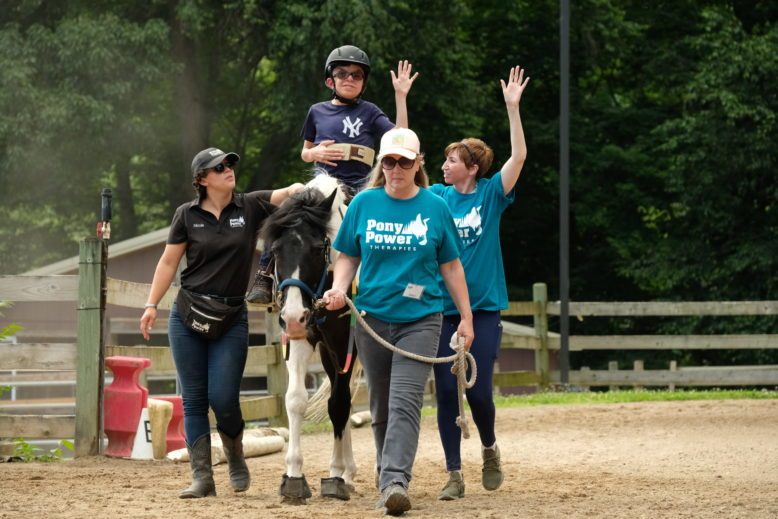
“Horses are like humans,” says Dana Spett, founder and executive director of Pony Power Therapies. “They want their basic needs met: food, water, shelter, companionship—and a purpose.”
For the 22 horses and ponies on Spett’s 13-acre, ADA-accessible farm in Mahwah, their purpose is to serve as therapists and teaching tools for clients of all ages with special needs.
The nonprofit serves about 200 clients weekly through customized therapeutic horseback riding, horse-assisted learning and a sensory garden program. Clients with autism learn teamwork through animal handling. Visitors with PTSD practice feeling secure in their surroundings. Students with ADHD work on concentration while riding.
“The horse doesn’t care about your diagnosis, your criminal record, your bank account, your religion, your politics [or] age. They don’t know an agenda,” Spett says. “And that’s where we take our lead.”
Spett—a lifelong equestrian, social work professor at Ramapo College, and a candidate for a doctorate of social work at Rutgers—started Pony Power in 2000 with just one horse. At the time, she was seeking alternative therapies for her daughter, who had core-strength issues.
Spett purchased the Mahwah property in 2003. The peaceful parcel is equipped with outdoor and indoor riding arenas, outdoor classrooms, educational barns and various trails.
There are two benefits to interacting with horses, Spett explains. “When you sit on the back of a horse, the input is the same as human gait,” she says. “When the horse is moving, it moves your body as if you’re walking.”
If riding a horse is not an option for a client, there are other ways to connect with the animal. “A horse will mirror what is going on with the other living being in front of them,” Spett adds. “Learning how to manage yourself around a horse is important for your interpretation of body language, safety, awareness, empathy, compassion and work ethic.”
Another feature of the property is the Farm in the Forest, a sensory garden where participants learn about everything from plant care to nutrition. A garden-expansion project is slated for completion in March, and the herd’s manure is used to fertilize the garden. In 2022, Pony Power collectively donated more than 2,000 pounds of food from the garden to Paterson’s Oasis—A Haven for Women and Children and Mahwah’s Center for Food Action.
The impact of Pony Power’s programs extends beyond the farm. “Families have different conversations after coming [here],” Spett says. “It’s not about going to treatment. It’s, ‘What horse did you ride? What did you do on the farm? How did that feel?’ Those experiences teach us that living in the moment is really what’s important.”
Pony Power Therapies was founded in 2000 by Dana Spett. The nonprofit uses horses and an accessible farm to enhance the physical, social and emotional well-being of clients who need extra support. There are also nine chickens, four sheep, three goats, three beehives and two pigs on the farm. Visit ponypowernj.org to learn more.
No one knows New Jersey like we do. Sign up for one of our free newsletters here. Want a print magazine mailed to you? Purchase an issue from our online store.



